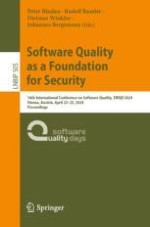2024 | OriginalPaper | Buchkapitel
On the Interaction Between Software Engineers and Data Scientists When Building Machine Learning-Enabled Systems
verfasst von : Gabriel Busquim, Hugo Villamizar, Maria Julia Lima, Marcos Kalinowski
Erschienen in: Software Quality as a Foundation for Security
Verlag: Springer Nature Switzerland
Aktivieren Sie unsere intelligente Suche, um passende Fachinhalte oder Patente zu finden.
Wählen Sie Textabschnitte aus um mit Künstlicher Intelligenz passenden Patente zu finden. powered by
Markieren Sie Textabschnitte, um KI-gestützt weitere passende Inhalte zu finden. powered by
